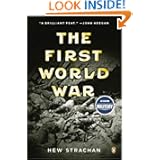History of Mexico - Phillip Russel
God's Chinese Son - Jonathan Spence
Debunking Economics: The Naked Emperor of the Social Sciences - Steve Keen
Bad Samaritans: The Myth of Free Trade and the Secret History of Capitalism - Ha-Joon Chang
Seeing like a State - James C. Scott
A Nation in Waiting: Indonesia's Search for Stability - Adam Schwarz
I'm really interested in what you think on the bolded titles. I've been looking for a good history of Mexico, kind of like an in-depth overview of the subject or something along the lines of the Oxford History of the United States series.
The other two I added to a list to track awhile ago, maybe because I saw an interview on TV with the author. But I've haven't gotten around to obtaining a copy to read yet. Are they worth a look?
I just finished Miller's
The President and the Assassin last night. It's a book, much like Candice Millard's
Destiny of the Republic, that focuses on a 19th century Republican US president who doesn't get a lot of modern attention and his eventual assassin. Miller's work alternates POV between chapters between McKinley's foreign policy and depictions of the battles while the other half of the book looks at the anarchist speakers of the time, Leon Czolsogz, and the suffering of the poor that aren't quite as privileged as the men on the top. Eventually, these two collide, spoiler alert, McKinley is shot, dies, then his assassin is tried and executed.
Both Miller's and Millard's books were released around the same time, and were structured similarly focusing on both the president and his eventual assassin, and the conclusion of each assassination. Miller's book was, on average, rated more highly than Millard's, but I think this masks important differences between the works. Given McKinley had a full term before he was assassinated, Miller takes more time to focus on the first term, the wars, and the emergence of the US as a global power. The assassination occurs, and everything following is resolved within the final 50-60 pages of the book, whereas the lead-in is nearly 300 pages. Compare this to Millard's book on Garfield, who was only in the office for about three months before being attacked. As a result of this short tenure, Millard focuses more on the development of medical science and the doctors trying in vain to save Garfield before his untimely death due to medical malpractice. Millard also has more sections devoted to Alexander Graham Bell trying to develop a metal detector to find the bullet.
So better or worse on an absolute scale, I think, is not the appropriate metric. Neither book is dry or unreadable, I found both enjoyable. The difference is in what you want to read in the bits that aren't directly about the assassination. If you like traditional political/economic-type histories, then you'll probably prefer Miller's book. If you prefer medical devices, invention, and the story of a suffering dude who had a lot of potential to be a good president, then you'll probably prefer Millard's.
In any case, the theme of Gilded Era -> Progressive Era Republican presidents continues! Digging into
Theodore Rex by Edmund Morris now; this is the second volume of his 3-part series that deals exclusively with his time as President of the United States. Picks up where Miller left off. Also plugging away on
Rise and Fall of the Whig Party when I have the time (on pg. ~410 out of 985 of the core book, excluding notes, bibliography, etc.).




 I love that guy.
I love that guy.